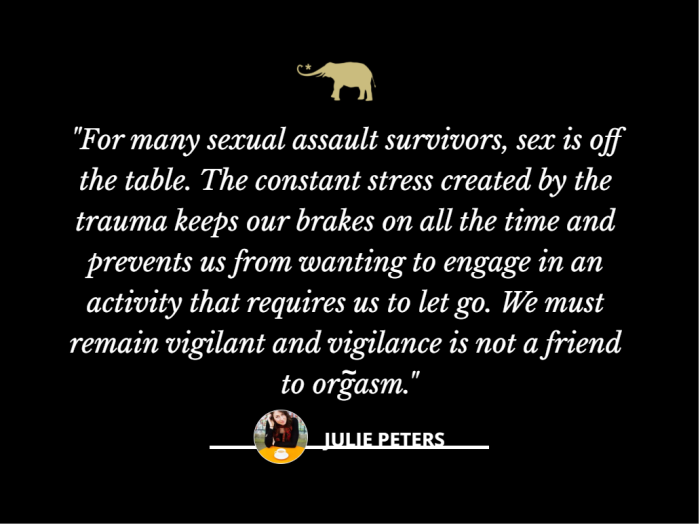This piece is excerpted from the book Want: 8 Steps to Recovering Desire, Passion, and Pleasure After Sexual Assault by Julie Peters
Have you ever heard the joke about how sex is like pizza—when it’s good, it’s great, and when it’s bad, it’s still pretty good? It’s a bad joke.
There is a huge difference between good sex and bad sex. Bad sex, as you probably know from your own experience, can f*ck your whole life up. Good sex, on the other hand, can heal the damage from all that bad sex. We can try to convince ourselves all day that sex is fine and comfortable and easy, but our bodies will not believe us until they can have that experience in real-time. The body does not forget, but it can learn new information.
After healing from sexual assault, sex has to change. Whatever our experience of sex before the assault and however it has affected our lives, sex can never be the same again. Here’s the good news: it can be way better.
At its best, sex is playful, fun, and pleasurable. The people involved can relax, be themselves, and let sensation take over. Orgasm is the ultimate expression of surrender, of total abandon. We need to feel powerful enough in our lives and in our relationships that we can surrender to the experience of sex. Even if we haven’t been sexually assaulted, many of us are so busy worrying about what we look like and how we’re performing, it’s a wonder any of us can relax enough to come at all, let alone have full-body, heart-shaking orgasms.
The way many of us have sex in this culture does not feed our erotic energy. Writer Audre Lorde sees our sex lives as having been pornified, by which she means disconnected from true emotional expression. She writes:
“The erotic has often been misnamed by men and used against women. It has been made into the confused, the trivial, the psychotic, and plasticized sensation. For this reason, we have turned away from the exploration and consideration of the erotic as a source of power and information, confusing it with the pornographic. But pornography is a direct denial of the power of the erotic, for it represents the suppression of true feeling. Pornography emphasizes sensation without feeling.”
Lorde’s argument is, in part, based on the idea that the erotic is a resource within women that has been suppressed and repressed by men. And while I think that makes sense, I believe that men and other genders have also been cut off from this energy, and that we all have the same right to access it within ourselves. Sex has been pornified for all of us. It takes some work to reconnect to our own erotic power as an expression of our deepest, truest selves.
For many sexual assault survivors, sex is off the table. The constant stress created by the trauma keeps our brakes on all the time and prevents us from wanting to engage in an activity that requires us to let go. We must remain vigilant and vigilance is not a friend to orgasm. Plenty of us avoid sex, mentally check out while we’re doing it, or fake orgasms to get it over with. Some of us seek out sex, chasing after inappropriate partners, or risky situations in a misplaced search for power. The orgasms that come from this kind of desperate desire tend to be shallow and plasticized, to paraphrase Audre Lorde. Even if we’re in safe, committed partnerships and are able to come most of the time, we may still be miles away from the deep connection and surrender that our erotic energy could bring us.
When we get into sex routines with our partners that are reasonably functional but lack deeper connection, sex therapist Ian Kerner points out, our orgasms can become “emotionally and creatively hollow, no better in qualitative terms than the sexual release each partner could have had on their own.” This kind of sex doesn’t bring us closer to our own authentic feelings or help us access our erotic power. Whether or not stress ramps up desire, it always dampens pleasure. It makes it harder for us to feel. This kind of sex is about power, pleasing a partner, or getting it over with, not about surrender, intimacy, or connection. This, Kerner says, “is the world of the lonely orgasm.”
In general, men have more social power than women or other marginalized groups (and they usually have more money), but they are messed up in their own special ways. Psychologist Steve Bearman argues in his essay Why Men are So Obsessed with Sex that in a patriarchal society that prevents men from fully accessing their vulnerability, sex becomes more important than perhaps it otherwise would be. Little boys are comforted and cuddled less than little girls, and then they are socialized to “take it like a man” and told that “boys don’t cry.” All this social training leaves men isolated and susceptible to sexual obsession. Bearman writes:
“Directly and indirectly, we are handed sexuality as the one vehicle through which it might still be possible to express and experience essential aspects of our humanness that have been slowly and systematically conditioned out of us. Sex was, and is, presented as the road to real intimacy, complete closeness, as the arena in which it is okay to openly love, to be tender and vulnerable, and yet remain safe, to not feel so deeply alone. Sex is the one place sensuality seems to be permissible, where we can be gentle with our own bodies and allow ourselves our overflowing passion. […] This is why men are so obsessed with sex.”
Heterosexual couples, then, can involve a woman who feels powerless and thus desire-less, and a man who desperately wants sexual connection because he isn’t allowed to feel his feelings anywhere else. He desperately craves it; she needs to know she can say no to it. Men are taught to pursue and push, women are taught their “no” doesn’t matter. We are set up for sexual violence along gendered lines from the get-go. And still, straight women are hardly the only ones who get assaulted. Gay men and women and plenty of transgendered and non-binary people have been through this, too, in many cases in even higher numbers. No wonder so many of us struggle with sexual issues. Sex is a minefield.
But there’s good news. Unlearning these cultural lessons can go a long way toward recovering the delightful healing possibilities of sexual intimacy.
There are plenty of ways to empower ourselves and create the space for loving (sexy) intimacy with each other, whatever our gender or sexual orientation.
When we can find ways to listen to our bodies, trust ourselves, and be brave in the face of our most uncomfortable feelings, we can become more powerful within ourselves.
When we feel powerful, we can be sexually vulnerable. When we’re not afraid to be vulnerable, we don’t have to depend on sex to feel powerful.


 Share on bsky
Share on bsky






Read 0 comments and reply